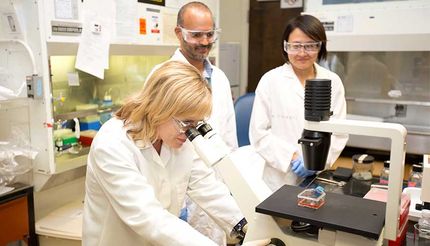Cytheris announces results of phase II study indicating that recombinant Interleukin-7 (CYT107) expands CD4 T-cells in gut mucosa of chronically HIV infected immunological non-responder patients
Advertisement
Cytheris SA announced results of a multi-center phase II study designed to investigate the potential of recombinant human Interleukin-7 (r-hIL-7, CYT107) therapy to reconstitute CD4 T-cells in chronically HIV-1 infected patients whose CD4 T-cell counts remained low despite treatment with anti-retroviral-therapies (HAART).
In addition to providing further evidence of the ability of r-hIL-7 to stimulate the expansion of CD4 and CD8 T-cells in peripheral blood, the results demonstrate the importance of IL-7 in stimulating T-cell repopulation of the lymphoid tissue layer in the mucosa of the gastro-intestinal (GI) tract. This effect, previously demonstrated in SIV infected monkeys, is now confirmed by analysis of rectosigmoid biopsies in this study of HIV infected patients defined as Immunological Non-Responders (INR). The data were presented at the 2012 Conference on Retroviruses and Opportunistic Infections (CROI) held in Seattle.
The results of the Phase II study (Abstract J-131: Gut mucosa T Lymphocyte restoration in chronically HIV-infected patients treated with recombinant Interleukin-7 (r-hIL-7) by Irini Sereti, Jacob Estes, William Thompson, Margaret Fischl, Therese Croughs, Stephanie Beq, Michael Yao, Mohamed Boulassel, Michael Lederman, and Jean Pierre Routy were presented by William Thompson from the laboratory of Irini Sereti, M.D., M.H.S., NIAID/NIH site study investigator and INSPIRE 2 study co-chair.
"CD4 T cell depletion in the gut mucosa is an important pathogenic event in HIV infection that is associated with T-cell activation and partially restored by ART(1)," said Jean Pierre Routy, MD, site study investigator in Mc Gill Hospital, Montreal. "It is now well documented that significant AIDS and non-AIDS morbidity and mortality persists in HIV infection, particularly in patients who fail to restore normal CD4 T-cell counts. The results of the current study indicate that r-hIL-7 administration can expand gut T lymphocyte numbers, predominantly central memory CD4+ T-cells and warrant further investigations of the clinical benefit of r-hIL-7 in HIV-INR patients."
Results of the Phase II (INSPIRE 2) Study
INSPIRE 2 is an open-label, multicenter Phase II study of CYT107 (r-hIL-7) in chronically HIV-infected persons with CD4 T-cell counts between 101-400 cells/mm3 and plasma HIV RNA less than 50 copies/mL. Twenty two patients were enrolled and received 20 mcg/kg/week of CYT107 for three weeks. All were evaluated at the planned primary end point (CD4 expansion) at week 12.
CYT107 was clinically well tolerated and without serious adverse events. Median CD4 and CD8 T-cell counts were 260 and 650 cell/mm3 at baseline and increased to 645 and 1390 cells/microlitre at week 12, respectively (both P less than 0.001).
A subset of 12 patients underwent rectosigmoid biopsies both at baseline and between weeks 10-24 (most at week 12). The proportion of gut mucosal CD4 (gated on CD3+) cells increased from 40.3 to 45.8 post-IL7 (P equals 0.05), as did the CD4 number (x10 to the power of 6 cells/gr tissue) from 2.5 to 4.7 (P equals 0.02). The increase was more evident in CD4 cells of central memory phenotype (CD45RO+/CD27+) from 1.8 to 3.6x10 to the power of 6 cells/gr tissue (P=0.01). The proportion and number of gut Th17+ cells did not change significantly. The proportion of cycling (Ki67+) gut mucosal CD4+ and CD8+ T-cells did not change post-IL7 (P equals 0.8 and P equals 0.2 respectively). Quantitative immunohistochemistry confirmed significant increases in gut CD3+ cells in the lamina propria (P equals 0.008). Interestingly, the immunophenotypic analyses of cryopreserved PBMC by flow cytometry at baseline and at week 12 in this subset of 12 patients showed a sustained increase in the expression of the gut homing receptor alpha 4 beta 7 integrin on peripheral CD4 and CD8 T-cells (1.4-fold in both) as early as day seven post first CYT107 administration with a peak increase at day 14 (p equals 0.0001). At week 12, alpha 4 beta 7 integrin remained elevated on peripheral CD4 and CD8 (p equals 0.001:) on T-cells. In addition, administration of CYT107 decreased, at week 12, biomarkers of monocyte activation (sCD14; D0 vs Week 12: 1.93 x 10 to the power of 6 to 1.73 x 10 to the power of 6, p less than 0.01:) and fibrin degradation (D-dimer; D0 vs Week 12: 0.24 to 0.14, p equals 0.05:) that have been linked to disease progression and mortality.


























































